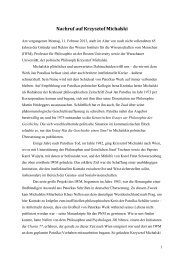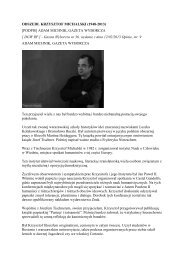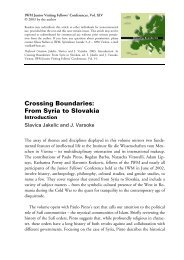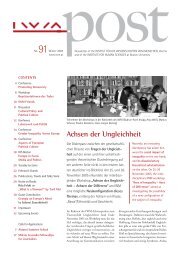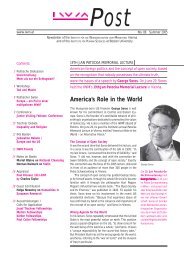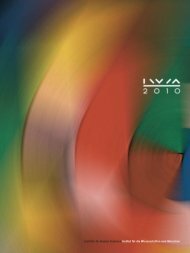Europe's Responsibility in the World of Today - IWM
Europe's Responsibility in the World of Today - IWM
Europe's Responsibility in the World of Today - IWM
Sie wollen auch ein ePaper? Erhöhen Sie die Reichweite Ihrer Titel.
YUMPU macht aus Druck-PDFs automatisch weboptimierte ePaper, die Google liebt.
Europe’s <strong>Responsibility</strong> <strong>in</strong> <strong>the</strong> <strong>World</strong> <strong>of</strong> <strong>Today</strong> REFLECTION GROUP<br />
strate a way out <strong>of</strong> <strong>the</strong> false dilemma on which fundamentalism<br />
thrives. A third target <strong>of</strong> a strategic<br />
transition policy would be <strong>the</strong> Middle East conflict,<br />
for which Israel is not <strong>the</strong> only source. Helpful<br />
here is Robert Cooper’s idea that <strong>the</strong> universal time<br />
l<strong>in</strong>e enforced by <strong>the</strong> Cold War has decomposed<br />
<strong>in</strong>to three time l<strong>in</strong>es after its end: pre-modern,<br />
modern and post-modern. What we witness today<br />
are conflicts along different time l<strong>in</strong>es. Modern and<br />
post-modern, i.e. open societies are highly vulnerable<br />
to pre-modern attacks. That is why<br />
modernisation is such an important precondition<br />
for security.<br />
But could a strategic transition policy <strong>in</strong> <strong>the</strong><br />
Middle East not also have a strong destabiliz<strong>in</strong>g<br />
effect, someone asked. Democratic procedures can<br />
easily be abused, and br<strong>in</strong>g<strong>in</strong>g freedom to <strong>the</strong> area<br />
can also result <strong>in</strong> ris<strong>in</strong>g fanaticism. The answer was<br />
that, first <strong>of</strong> all, modernisation is <strong>the</strong> priority, with<br />
democratisation be<strong>in</strong>g only a part <strong>of</strong> it, <strong>of</strong>ten requir<strong>in</strong>g<br />
a long-term perspective. Moreover, one has to<br />
differentiate: countries like Iran have a strong<br />
democratic potential which should be supported<br />
all <strong>the</strong> more s<strong>in</strong>ce Iran has also a nuclear potential<br />
which could have a destabiliz<strong>in</strong>g effect on <strong>the</strong><br />
whole region. In any case, <strong>the</strong>re is no choice: <strong>the</strong><br />
problems emerg<strong>in</strong>g from <strong>the</strong> situation <strong>in</strong> <strong>the</strong><br />
Middle East are a challenge <strong>the</strong> West cannot avoid.<br />
It has to react.<br />
There was a consensus that nei<strong>the</strong>r Europe<br />
nor <strong>the</strong> US is alone able to respond to this challenge.<br />
It was underl<strong>in</strong>ed that <strong>the</strong> new strategic dimension<br />
<strong>of</strong> <strong>the</strong> EU is not directed aga<strong>in</strong>st <strong>the</strong> US.<br />
As a participant put forward, a common effort to<br />
shape <strong>the</strong> process <strong>of</strong> globalization and to fight <strong>the</strong><br />
threat <strong>of</strong> terrorism represents a real chance for a<br />
restoration <strong>of</strong> <strong>the</strong> West based on a new<br />
transatlanticism. Transatlantic relations have to be<br />
re<strong>in</strong>vented, with EU be<strong>in</strong>g <strong>the</strong> European pillar, <strong>the</strong><br />
US and Canada be<strong>in</strong>g <strong>the</strong> North-American pillar,<br />
and <strong>the</strong> new NATO be<strong>in</strong>g <strong>the</strong> l<strong>in</strong>k between both<br />
pillars.<br />
* Bronislaw Geremek’ s reflections about Europe <strong>in</strong> <strong>the</strong><br />
<strong>World</strong> can be downloaded from Tr@nsit onl<strong>in</strong>e (http://<br />
www.iwm.at/t-forum.htm). A German translation is<br />
published <strong>in</strong> Transit – Europäische Revue, no. 27 which<br />
is, as no. 26, devoted to <strong>the</strong> results <strong>of</strong> <strong>the</strong> Reflection Group<br />
(see also <strong>the</strong> advertisement <strong>in</strong> this Newsletter).<br />
Participants<br />
Christoph Bertram<br />
Chairman <strong>of</strong> <strong>the</strong> Board,<br />
Foundation Science and<br />
Politics, German Institute<br />
for International Politics<br />
and Security, Berl<strong>in</strong><br />
Kurt Biedenkopf<br />
Member <strong>of</strong> <strong>the</strong> Federal<br />
Parliament <strong>of</strong> Saxony,<br />
Dresden; Member <strong>of</strong> <strong>the</strong><br />
Reflection Group on<br />
“The Spiritual and<br />
Cultural Dimension <strong>of</strong><br />
Europe”; former Prime<br />
M<strong>in</strong>ister <strong>of</strong> Saxony;<br />
former President <strong>of</strong> <strong>the</strong><br />
German Bundesrat<br />
Maarten Brands<br />
Pr<strong>of</strong>essor <strong>of</strong> History em.<br />
at <strong>the</strong> University <strong>of</strong> Amsterdam;<br />
Founder <strong>of</strong> <strong>the</strong><br />
Duitsland Instituut Amsterdam<br />
Andrzej Byrt<br />
Polish Ambassador to<br />
Germany, Berl<strong>in</strong><br />
Oldrich Cerny<br />
Executive Director, Forum<br />
2000, Prague; former<br />
Director General <strong>of</strong> <strong>the</strong><br />
Czech Foreign<br />
Intelligence Service<br />
Robert Cooper<br />
Director-General,<br />
Council <strong>of</strong> <strong>the</strong> European<br />
Union, Brussels<br />
Jean-Claude Eeckhout<br />
Special Advisor to <strong>the</strong><br />
President <strong>of</strong> <strong>the</strong><br />
European Commission,<br />
Romano Prodi, Brussels<br />
Silvio Fagiolo<br />
Italian Ambassador to<br />
Germany, Berl<strong>in</strong><br />
Silvio Ferrari<br />
Pr<strong>of</strong>essor <strong>of</strong> Church and<br />
State Relations,<br />
Universitá degli Studi di<br />
Milano; Member <strong>of</strong> <strong>the</strong><br />
Board <strong>of</strong> Directors <strong>of</strong> <strong>the</strong><br />
International Academy<br />
for Freedom <strong>of</strong> Religion<br />
and Belief, Wash<strong>in</strong>gton;<br />
Member <strong>of</strong> <strong>the</strong><br />
Reflection Group on<br />
“The Spiritual and<br />
Cultural Dimension <strong>of</strong><br />
Europe”<br />
Joschka Fischer<br />
M<strong>in</strong>ister for Foreign<br />
Affairs <strong>of</strong> <strong>the</strong> Republic <strong>of</strong><br />
Germany<br />
Bronislaw Geremek<br />
Pr<strong>of</strong>essor <strong>of</strong> European<br />
History, College <strong>of</strong><br />
Europe, Warsaw; former<br />
Polish M<strong>in</strong>ister for<br />
Foreign Affairs; Member<br />
<strong>of</strong> <strong>the</strong> Reflection Group<br />
on “The Spiritual and<br />
Cultural Dimension <strong>of</strong><br />
Europe”<br />
Pierre Hassner<br />
Emeritus Research<br />
Director, National<br />
Foundation for Political<br />
Science FNSP, Paris<br />
Ivan Krastev<br />
Chairman <strong>of</strong> <strong>the</strong> Board,<br />
Centre for Liberal<br />
Strategies, S<strong>of</strong>ia<br />
Boris Lazar<br />
Czech Ambassador to<br />
Germany, Berl<strong>in</strong><br />
Krzyszt<strong>of</strong> Michalski<br />
Rector, Institute for Human<br />
Sciences, Vienna;<br />
Pr<strong>of</strong>essor <strong>of</strong> Philosophy,<br />
University <strong>of</strong> Warsaw<br />
and Boston University;<br />
Member <strong>of</strong> <strong>the</strong> Reflection<br />
Group on “The Spiritual<br />
and Cultural Dimension<br />
<strong>of</strong> Europe”<br />
Kenneth Murphy<br />
Editor, Project Syndicate,<br />
New York/London;<br />
Project Associate, Institute<br />
for Human Sciences,<br />
Vienna<br />
Michael Naumann<br />
Publisher, Die Zeit, Hamburg<br />
Ton Nijhuis<br />
Director, Duitsland<br />
Instituut Amsterdam<br />
Andrzej Olechowski<br />
Co-founder and chair <strong>of</strong><br />
<strong>the</strong> Program Council,<br />
Platforma Obywatelska<br />
(PO, “Citizens Platform”),<br />
Warsaw; former M<strong>in</strong>ister<br />
<strong>of</strong> Foreign Affairs <strong>of</strong> <strong>the</strong><br />
Republic <strong>of</strong> Poland;<br />
former economic<br />
advisor to President<br />
Lech Walesa<br />
Christian Prosl<br />
Austrian Ambassador to<br />
Germany<br />
Michel Rocard<br />
Chairman <strong>of</strong> <strong>the</strong><br />
Committee for Cultural<br />
Affairs, European<br />
Parliament; Member <strong>of</strong><br />
<strong>the</strong> Delegation for<br />
Relations with <strong>the</strong> United<br />
States; Member <strong>of</strong> <strong>the</strong><br />
Reflection Group on<br />
“The Spiritual and<br />
Cultural Dimension <strong>of</strong><br />
Europe”; former Prime<br />
M<strong>in</strong>ister <strong>of</strong> France<br />
Adam Daniel Rotfeld<br />
State Secretary (deputy<br />
Foreign M<strong>in</strong>ister) <strong>in</strong> <strong>the</strong><br />
M<strong>in</strong>istry <strong>of</strong> Foreign<br />
Affairs, Warsaw; member<br />
<strong>of</strong> <strong>the</strong> National Security<br />
Council; former Director<br />
<strong>of</strong> <strong>the</strong> Stockholm International<br />
Peace<br />
Research Institute<br />
(SIPRI)<br />
Gerhard Sabathil<br />
Head <strong>of</strong> Representation,<br />
European Commission <strong>in</strong><br />
Berl<strong>in</strong><br />
Klaus Scharioth<br />
State Secretary <strong>of</strong> <strong>the</strong><br />
Federal Foreign Office<br />
Charles <strong>of</strong> Schwarzenberg<br />
President, Board <strong>of</strong><br />
Patrons, Institute for<br />
Human Sciences, Vienna<br />
Gerfried Sperl<br />
Editor-<strong>in</strong>-Chief, Der<br />
Standard, Vienna<br />
Aleksander Smolar<br />
President, Stefan Batory<br />
Foundation, Warsaw;<br />
Research Fellow, Centre<br />
National de la Recherche<br />
Scientifique, Paris<br />
3<br />
<strong>IWM</strong> NEWSLETTER 84 Spr<strong>in</strong>g 2004/No. 2



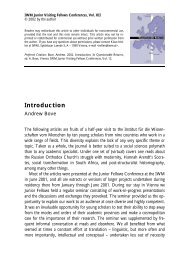
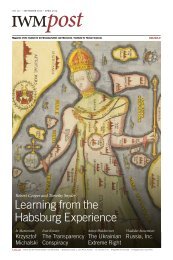
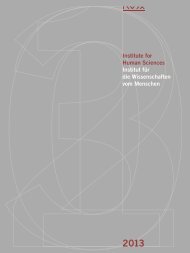
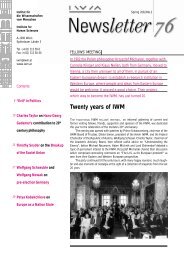
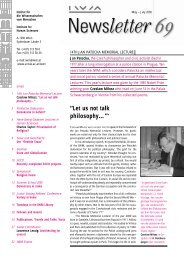
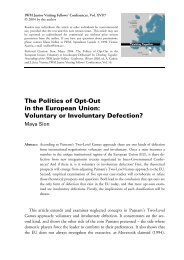
![POSZUKIWAÅ PRAWDY I ZABAWY [PODPIS] PROF ... - IWM](https://img.yumpu.com/23611273/1/184x260/poszukiwaa-prawdy-i-zabawy-podpis-prof-iwm.jpg?quality=85)
